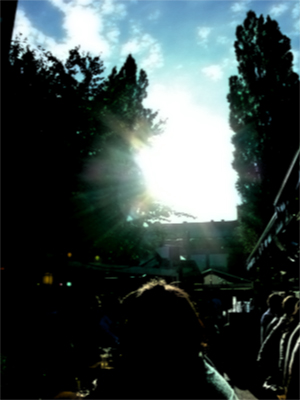"Hela världen är så underbar om man är korkad, tom och glad..."
 My friend Gina passed along a fantastic article from Adbusters today, "Hipster: The Dead End of Western Civilization."
My friend Gina passed along a fantastic article from Adbusters today, "Hipster: The Dead End of Western Civilization."Douglas Haddow, the article's author, writes with frightening precision: "An artificial appropriation of different styles from different eras, the hipster represents the end of Western civilization – a culture lost in the superficiality of its past and unable to create any new meaning. Not only is it unsustainable, it is suicidal. While previous youth movements have challenged the dysfunction and decadence of their elders, today we have the “hipster” – a youth subculture that mirrors the doomed shallowness of mainstream society."
While the attraction to a "hipster" lifestyle is obviously a problem now, showing our generation's attraction to, as Haddow puts it, "a self-obsessed aesthetic vacuum," there will also be consequences further down the line. What kind of bildungsroman will come out of this substanceless void?
As anyone who has seen a film like Joachim Trier's Reprise or read a novel like Douglas Coupland's Generation X knows, the social movements occurring in our youths and adolescences have a profound affect on the choices we make with our lives -- even if our life is defined by a rejection of a popular subculture or counterculture (and maybe in this there is still hope that some profound works of art can come out of this "hipster" movement, out of the shortened attention spans of the Internet Generation...). Films like Reprise and novels like Generation X would not be as powerful if their audience could not see a warped reflection of their own life in the work, if the viewers/readers could not relate to the pasts presented in the creations. These facets of our lives were important, and the knowledge and self-awareness we garnered from our passage through various social movements subsequently make the works more "real" or "true" to us.
When my father asked me when I was 12 whether I'd like to study in England, a significant amount of the reason why I said "yes" was because of, as ridiculous as it seems now, The Clash. I though the UK would be full of punk rockers, that possibly my proximity alone to many of the pioneers of this musical and social revolution would benefit my life in a way that suburban Virginia was not. The fact that I moved over just as the rave scene was on its final, faltering legs and midway through the Brit Rock movement was... devastating.
I met Ella Torkelsson, the girl I ended up moving to Sweden with, in Oxford City Parks with a bunch of street punks and other assorted miscreants. I started a punk record label with the help of close friends Anna Maria Pelot and Daniel Grönblad, and with the added support of numerous others during the label's short run. It wasn't until the twilight of my teenage years that punk ceased to be one of the driving forces of my life. Other influences filtered in, as they always do in our formative years, and as soon as I shifted my focus from the anger and youthful energy that started in the late-70s to bands that progressed the punk sound (Joy Division, Wire, etc.), there was no going back -- I continued to stumble forward.
It wasn't just the music, there was a sense of belonging and acceptance in the punk scene for me. Even as the varied post-hardcore movement sprung up in the late 90s and early 00s around an amalgamation of different sounds and influences, this open mentality remained thoroughly in focus, at least as far as my experiences in England and Sweden were concerned. Youth has a lot to do with this as well, but I remember at 20 and 21 going to see bands like Devotion to Trust, The Kind That Kills, Cursed, or When We Fall and finding myself in alleys drinking cheap cider and liquor with newly-found, likeminded kids.
The youth movements of the previous decades have had a profound impact on the artistic creations we have today, whether the artist or author or filmmaker was a punk when they were younger, or a New Waver, a Springsteen fan, a prog-rock fanatic... I am not sure what this elitist "hipster" movement will produce in years to come. Where punk was a refuge from the various difficulties of my youth and adolescence, a liminal territory where outsiders no longer had to feel cast off, this current scene is more akin to being popular enough to sit at the Cool Table in high school -- and popular kids know that acceptance is the surest way for them to lose their positions of esteem.
Kommentarer
Trackback